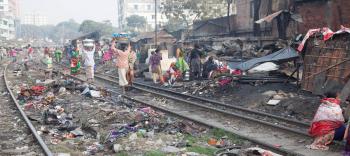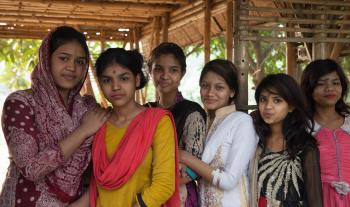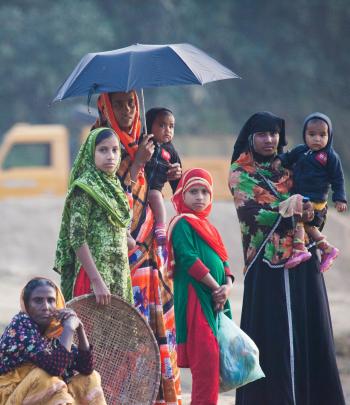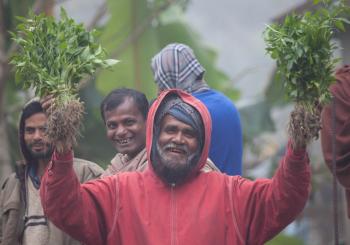Impressed with an almost-month-long tour of Bangladesh
This article appears on page 20 of the September 2018 issue.
Why Bangladesh?" That's what our friends asked us repeatedly when they found out about our planned visit. We didn't know anyone who had ever been to Bangladesh, and it was hard to even find a tour book (though we ultimately found guidebooks from both Lonely Planet and Bradt).
Several years ago I had planned to fly over to Dhaka, Bangladesh, for a 2-day of photo tour with Nijhoom Tours before a separately planned tour to India. Unfortunately, the photo tour got canceled, but I was impressed that the owner of Nijhoom Tours refunded all my money — not easy to do through the Bangladesh monetary system. *Raw Hasan, the owner, made the comment, "We don't cheat people in Bangladesh." I remembered that.
Getting started
On Dec. 30, 2017, my wife, Janice, and I embarked on a 27-day custom tour of Bangladesh with Nijhoom Tours (Dhaka, Bangladesh; nijhoom.com). Called "Discover Bangladesh," the tour cost *$3,850 per person (for two), including a driver, a guide, entrance fees, hotels and some meals.
We thought we would have to join a group, but Hasan said that just the two of us could start the trip anytime. It seemed too good to be true, but the price was right, and the flexible dates suited my work schedule.
Janice has to travel with her legs flat on the seat due to a medical condition, so we cannot travel by car. The fact that we would travel by van sealed the deal.
We arrived in Dhaka on New Year's Eve to a jumble of traffic. Hasan was there to meet us with a smile.
We had planned to take New Year's Day as a rest day, but by afternoon we had ventured out to find an ATM. They were plentiful in Dhaka, though we were warned that getting cash outside this major city could be an issue. You can get 20,000 taka (about $240) from most machines, so we hit the machines with several cards; however, in other cities, we did find more ATMs than we had anticipated.
We went into and out of Dhaka about four times during this trip, each time staying at the Lakeshore Banani Hotel. (No lakeshore there, but apparently there is at another Banani location.)
We loved this hotel. The beds were luxurious (though, at the time, we didn't know it could be otherwise), breakfast was superb, and a wide variety of food was offered for dinner.
We got to know the staff, and they came to know us. When we left, I even tipped the guards (with their shotguns), and there were hugs all around!
What to expect
Let's talk about Bangladesh. If you are expecting luxury at every turn, I'd suggest that you stay home. Even if you've traveled in Myanmar and India, you'll be stunned by the poverty in Bangladesh. Vietnam, Laos and Cambodia are luxurious by comparison.
If visiting Bangladesh, you'll need a vast sense of adventure and patience. I believe that Dhaka, the capital, has the worst traffic I've ever seen — worse than in Delhi, Cairo… you name it. The roads are blacktop with chuckholes in abundance; some of the holes are so deep, they've been filled in with bricks!
We averaged 30 kph in the country, and the roads were rough. We saw buses with all the paint scraped off their sides from rubbing against other buses. However, we got through the whole trip without a scratch thanks to Litin, our skilled driver.
So why bother? Janice and I have traveled the world extensively — Africa, Iran, etc. — and this was the greatest trip we have ever taken. We made a thousand friends. No one bumped us, pushed us, insulted us or was anything other than extremely polite and courteous.
When people asked where we were from and we replied "America," they shrieked with delight. Everyone we met was immensely friendly.
Muslims, Buddhists and Hindus seemed to accept each other with grace, and people appeared proud of their country and its rising economy. They have hope for the future.
Great hospitality
On this trip, we asked for the best hotels available and got them. In Dhaka, the Lakeshore Bani was delightful. We stayed in fancy tourist hotels in the tea-growing areas and enjoyed food as good as I've had anywhere. (A huge dinner buffet cost $10 each.)
Hasan did his best to get great hotels, but in some rural areas there just aren't any. One night in the Sundarbans (national park), we had no power for hours but, of course, had flashlights. Eventually, the power did come back on.
Also, we were warned that the dinner at that hotel was not good, so we stopped to stock up on a big bag of snacks for dinner ($4 for both of us).
Our guide, Arafat, and our driver, Litin, took great care of us. We felt safe at all times.
Arafat quickly figured out how much Janice could do with her legs. We traveled by van, boat, dugout canoe and train. Even the second-class train cars were excellent, but we were booked in first class!
We are wimps with spicy food, so Arafat had the cooks tone down the spices for us. He also gave Janice cooking lessons on dishes that we still prepare at home.
We enjoyed philosophical discussions with Arafat, and he and Litin became good friends of ours. We still correspond. Arafat even invited us for lunch at his home, and we met his mother, who gave us gifts.
The Bangladeshi people are very gentle and peaceful, treating each other with a dignity and respect I haven't seen in some time. We came home to our monstrously huge house feeling a bit humbled.
On the river
One of the highlights of the trip was an overnight on a Rocket paddle-wheel steamer ship. We had a bed that was quite comfortable, and the next day we were served eggs and bread for breakfast. (One floor below, the locals slept on the wooden floor with light blankets.)
We experienced the coldest January Dhaka had had in a hundred years and were ill prepared, since the weather had been in the 70s previously. Arafat took us to a street market, where we each bought a heavy Russian surplus coat for $6.
Also memorable was a 3-day cruise through the Sundarbans, the largest mangrove forest reserve in the world. Our private ship had a crew of six just for us. The food was magnificent each day, featuring fresh vegetables, fish, lamb and chicken from the local markets.
None of the crew spoke English, but we all had a great time. I passed out cigars, and the captain, Arafat and I enjoyed them sitting at the bow of the ship on a comfortable bench while the sunlight washed over us. I felt like a pharaoh!
Each morning and evening, Janice and I got off the boat and into a dingy, and the crew rowed us into the quiet estuaries. Alligators near the shore let us approach within 50 feet before they dove into the water. Spotted deer were in abundance.
There was fog for most of the morning until around 10 a.m., returning again in the evening, but we had no rain the entire trip!
Our cabin was down below and had a private toilet and sink but no shower. The crew ran the generator daily, so we could charge our photo equipment. Our futon was comfortable though not luxurious.
On the last day of the cruise we got cell phone service again for the first time in three days. That was fortunate, as the motor quit about 20 kilometers from our port. Very quickly, Arafat contacted the ship's owner, who sent out a tug to push us in. It was exciting — again demonstrating the flexibility required to travel in this country.
Feeling welcomed
We went up rivers in dugouts powered by one-cylinder diesel engines that are so common in this part of the world. On multiple occasions, we went ashore to visit tribal villages, which we couldn't have done without Arafat and his knowledge of the local area. Even if we were delayed, our van was waiting to pick us up.
All the people we met were curious about us, as many had not seen white faces before. These wonderful, warm people let us into their private lives and spaces, and we felt welcomed and honored to be there.
I can't say enough about our guide and our driver, who modified the trip as we went along based on what we wanted to see. Arafat suggested we skip the train to Srimangal because the train only stops for four minutes to let everyone off, and he was afraid, with our luggage, that we wouldn't be able to get off the train in time, so we took the van instead (at an extra charge).
On our last day, Arafat took us to Aarong, a department store in Dhaka that sold crafts from all over Bangladesh. We bought so many fabrics ($210 worth) that we had to go to the market to buy another suitcase ($40) to get it all home. It was well worth it!
Nijhoom Tours and Hasan did everything he said they would do and more. There were no slipups during the entire month. I trusted the process and was not disappointed.
The only change I would have made would be to skip the visit to Cox's Bazar, which is really just a long beach. The Long Beach Hotel there was very noisy, but with our earplugs and white-noise machine, we slept well.
If you've been to Paris and Rome and want a trip that is truly unique, visit the Nijhoom Tours website to see what they have to offer.
* Correction : The author of the Feature Article on Bangladesh let us know about a couple of errors he discovered after publication. Please see here for more info.




